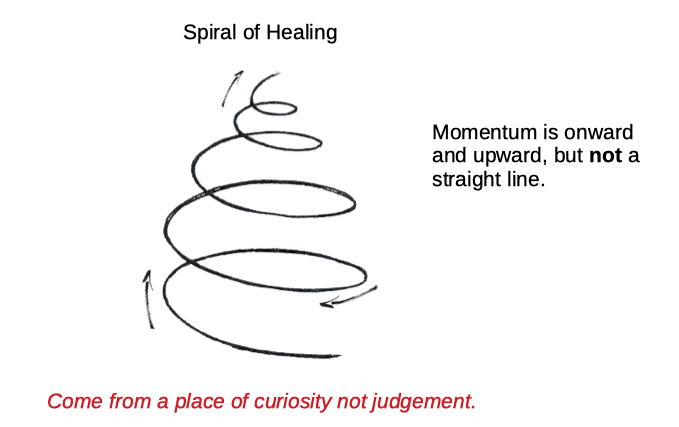As you move forward on this journey to create a healthier relationship with food and your body, I encourage you to pay careful attention to your internal dialogue.
Every eating experience is an opportunity to learn, regardless of whether you feel that experience was positive or negative.
Learning how to let go of dieting and begin listening to and trusting your body is a process of self-discovery and personal growth.
There are no mistakes or failures, just more learning opportunities.
Cultivating self-compassion, rather than feelings of shame and blame for difficult experiences relating to your body, will help facilitate positive change.
This will also help move you towards a more respectful and accepting view of your 'here and now' body.
Our happiness, well-being, and ability to take greater personal initiative to make necessary changes are inherently linked to our ability to show self-compassion.
Our default response is usually not compassion.
In many cases, our first response to pain or shame is defensiveness in order to self-protect.
We look immediately for someone or something to blame in an effort to protect ourselves. In certain cases, we may turn to judgment or go right into fix-it mode.
Every eating experience is an opportunity to learn, regardless of whether you feel that experience was positive or negative.
Learning how to let go of dieting and begin listening to and trusting your body is a process of self-discovery and personal growth.
There are no mistakes or failures, just more learning opportunities.
Cultivating self-compassion, rather than feelings of shame and blame for difficult experiences relating to your body, will help facilitate positive change.
This will also help move you towards a more respectful and accepting view of your 'here and now' body.
Our happiness, well-being, and ability to take greater personal initiative to make necessary changes are inherently linked to our ability to show self-compassion.
Our default response is usually not compassion.
In many cases, our first response to pain or shame is defensiveness in order to self-protect.
We look immediately for someone or something to blame in an effort to protect ourselves. In certain cases, we may turn to judgment or go right into fix-it mode.
You might worry that self-compassion could be used as an excuse to overindulge or let yourself off the hook, but I assure you this is not the case.
Having a neutral and compassionate understanding view of yourself and your behaviours will help you overcome the guilt or shame that may have been associated with your choices in the past.
Self-compassion is a powerful tool we can use to promote positive changes in our behaviour.
You may know from your own experience that being overly self-critical or bullying yourself when you make a mistake can be very damaging, and over time this erodes your self-confidence and just makes you feel worse.
Individuals who are more self-compassionate find it easier to show vulnerability, make mistakes, change unhealthy behaviours and take on new challenges, like creating a more peaceful relationship with food and your body and learning how to eat intuitively.
"With self-compassion, we mindfully accept that the moment is painful and embrace ourselves with kindness and care in response, remembering that imperfection is part of the shared human experience".
- Dr. Kristin Neff
In this journey to re-discover Intuitive Eating, progress is not linear.
We don't go from Point A to Point B.
Instead, think of progress more in terms of a spiral of healing, where momentum is onward and upward.
Notice how the spiral loops back on itself. These loops might be times when you revert back to unhealthy coping mechanisms or old ways of thinking or doing. Just notice these events, without self-criticism or judgment.
The self-reflection exercise in the link below is designed to help you begin to cultivate self-compassion.
We don't go from Point A to Point B.
Instead, think of progress more in terms of a spiral of healing, where momentum is onward and upward.
Notice how the spiral loops back on itself. These loops might be times when you revert back to unhealthy coping mechanisms or old ways of thinking or doing. Just notice these events, without self-criticism or judgment.
The self-reflection exercise in the link below is designed to help you begin to cultivate self-compassion.
Download a PDF version of this self reflection exercises here.
Nutrition Counseling and weight management programs. The information on this site is intended to inform, not prescribe.
For diagnosis and treatment medical and health related concerns, please seek the advice of a qualified physician.
For diagnosis and treatment medical and health related concerns, please seek the advice of a qualified physician.
Terms & Conditions | © 2014 Nutrition Expert For You. All rights reserved.
Proudly powered by Weebly



